Israel's position has never been better; now is the time to capitalize
Following Hamas' decimation and Hezbollah's severe setback, Assad's fall marks another blow to Iran's regional axis. As Israel discusses seizing the momentum and striking Iran, Trump and his advisers are considering renewing "maximum pressure" through sanctions and economic isolation. Meanwhile, a remote British island in the Indian Ocean exposes European hypocrisy toward Israel.
Ariel Kahana
Israel Hayom
Dec 13, 2024
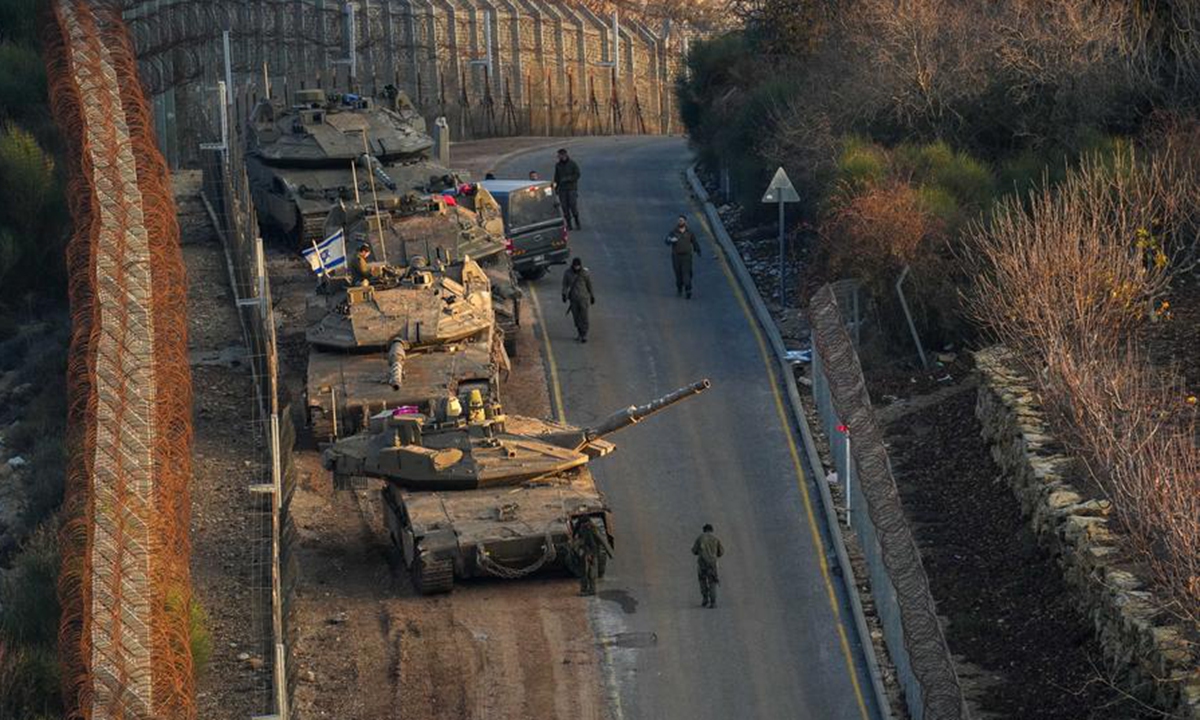
This photo taken on Dec. 8, 2024 shows Israeli troops near the buffer zone between Syria and Israel in the Golan Heights.
Jet contrails crisscrossed the high skies over the Golan Heights, interweaving with cirrus clouds. The tiny dots releasing white smoke streaked from east to west, leaving little doubt about where they came from and what they had done just minutes earlier somewhere in Syria.
Below them, at Tel Saki, I meet a group of "Pera" fighters, a combat reserve unit of Golan residents monitoring the eastern frontier. The famous "Hill Line" where we stand on Monday morning was, until 48 hours ago, a tourist route commemorating the legacy of the Yom Kippur War. Now, suddenly, it has awakened as a war front. Among the monuments and signs telling the stories of 1973, this winter's warriors plan their future moves. This is how "the eternal one of Israel that shall not deceive" manifests itself.
"Pera" was established as a lesson from Hamas' invasion of southern Israel last year. Over black coffee and a map spread on the rock, the Golan natives study their sector and prepare for any potential trouble. They won't be caught off guard again. Battalion 8552 deployed in the sector was also created due to the war. It consists of former combat unit members who insisted on returning to the reserve force, even though the IDF hadn't officially recalled them. They were mobilized under emergency orders three times – first to Nahal Oz, then to the Ephraim Brigade, and now to the Golan.
"We started to understand dramatic developments were unfolding the previous Tuesday," says Lt. Col. (Res) Itamar, deputy commander of Battalion 8552. "We received reinforcements and recalled people from home. By Saturday, we understood we were going to enter Syria, and our role was to transfer forces and secure topographically significant areas affecting defensive capabilities. The entry itself was incredibly moving. I was there. Nothing like this had happened in 50 years. Alertness was extremely high, especially since this wasn't an event anyone expected. We had prepared to maneuver in Lebanon or Gaza, not Syria. But this is now a different reality and a different mindset. The Golan's defense system is now behind us."
Do you have contact with the local population?
"Most of the population has left. Armed individuals are visible at a distance but don't approach. Children herding sheep wave hello to us."
My tour continues at the foot of Mount Bental, where steel track marks carved into the ground reveal who passed through here just hours ago and in which direction. At many junctions near the border, military jeeps and light vehicles face eastward. The persistent buzzing of drones accompanied them from above.
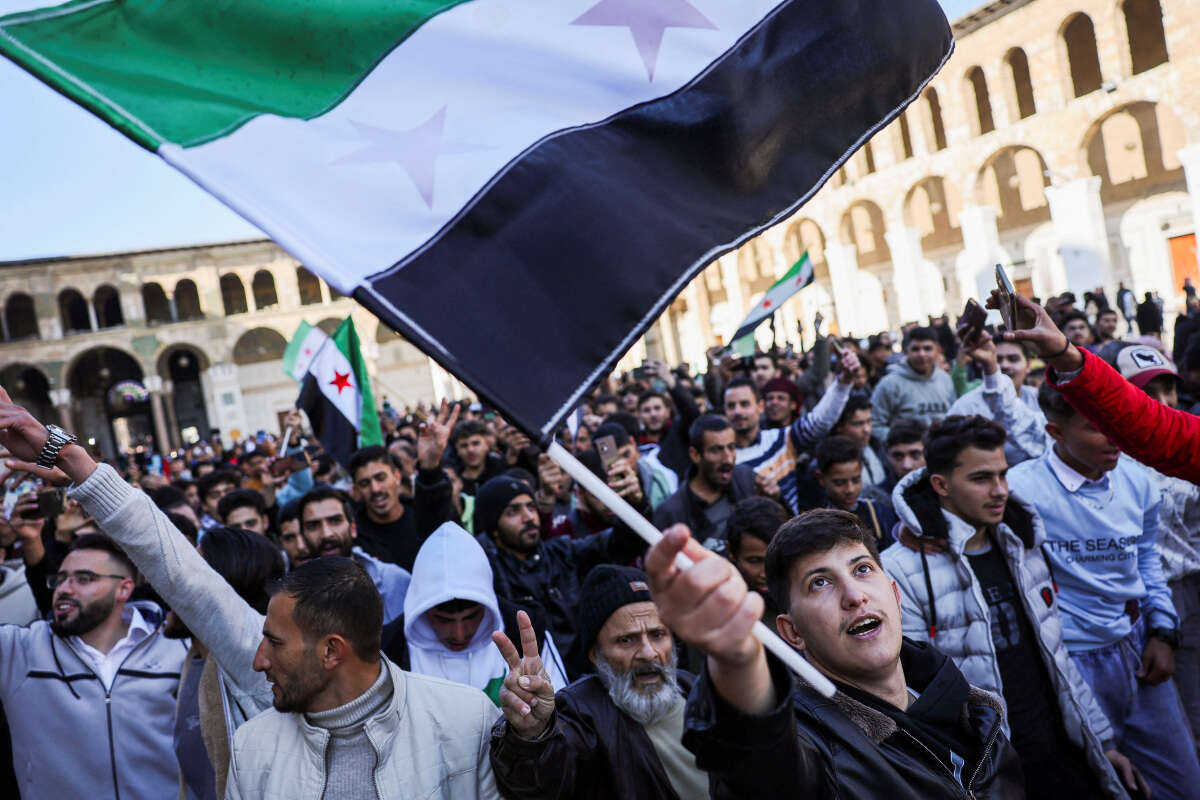
People walk with flags before the first Friday prayers at the Umayyad Mosque, after fighters of the ruling Syrian body ousted Syria's Bashar al-Assad, in the Damascus old city, Syria, December 13, 2024
"It's quiet here today, but yesterday and Saturday, we clearly heard the fighting and the constant air force flights," says Yehoshua Moskowitz, a resident of Alonei HaBashan, Israel's easternmost settlement. Since the war began, the community has been on high alert. The gate is locked. Posts are scattered throughout the settlement. The readiness unit to which Moskowitz belongs is mobilized.
Ironically, after a year and two months of peak tension, "last Thursday, when they saw the ceasefire with Lebanon stabilizing, they decided to release the readiness unit," says Tamir Forsher, chairman of the community council. "But then the internal chaos in Syria started. We heard the shooting clearly and contacted the relevant authorities. At first, they didn't really understand what we wanted and responded with indifference, but on Saturday night, they mobilized the unit again. They only had two days of respite."
Together, we climb Tel Hazeka near Alonei HaBashan, adjacent to the border. In the valley below us, Israel operated a camp for Syrian civil war refugees in the past decade. Under the radar, connections are still maintained with the Druze minority in the heights and other sympathetic forces. But now, on the heights like everywhere else, all is quiet and pastoral, even on the Syrian side.
Smoke rises in the distance. Vehicles move here and there. While we chase after the war and don't see much, the IDF is writing a magnificent historical chapter east of us. The main offensive capabilities of the Syrian army were and are no more. The Israeli air and naval forces destroyed them, while ground forces seized the buffer zone, including the snow-capped Hermon peak in the distance. For now, it can be cautiously assessed that the Syrian Hermon and buffer zone will remain in Israeli hands until the coming of the Messiah. Perhaps even after.
Contrary to all predictions
The fall of Bashar al-Assad's regime and the elimination of his army are stunning byproducts in terms of Israel's interests. After the destruction of most of Hamas' force and the severe blow to Hezbollah, the Iranian axis built with such effort has gone up in flames. Moreover, when the Iranians have no foothold in Syria, it's hard to see how they'll rebuild the axis.
Prime Minister Benjamin Netanyahu was right in every word when he said, "The collapse of the Syrian regime is a direct result of the heavy blows we dealt to Hamas, Hezbollah, and Iran. A new, dramatic chapter has opened in Middle East history. Yesterday, something fell – literally. Assad's regime in Syria, a central link in Iran's axis of evil, collapsed after 54 years. Iran invested many billions in Syria, everything went down the drain."
True, neither he nor anyone else predicted Assad would fall. Probably not even the rebels themselves. Incidentally, the only one in the Israeli system who foresaw turbulence in Damascus is the new Military Intelligence chief, Shlomi Binder. "Eyes on Syria," he repeatedly told his people in recent weeks. Still, even before the Hamas massacre, but certainly after it, we must wake up from the illusion that intelligence can provide strategic forecasts. No intelligence agency predicted the fall of the USSR, Ceaușescu, or Mubarak.
And, of course, one year and two months after October 7, no one could have guessed that the outcome of that Saturday would be the collapse of the Iranian axis. Yet here we stand, and not by chance. Now, the question is what to do with Israel's rare strategic advantage over the Islamic Republic. The obvious answer is the destruction of the nuclear program. Iran remains without its defensive layers – Hamas, Hezbollah, Assad, the air defense array – and with half its offensive capability. There hasn't been, and may never be a better opportunity.
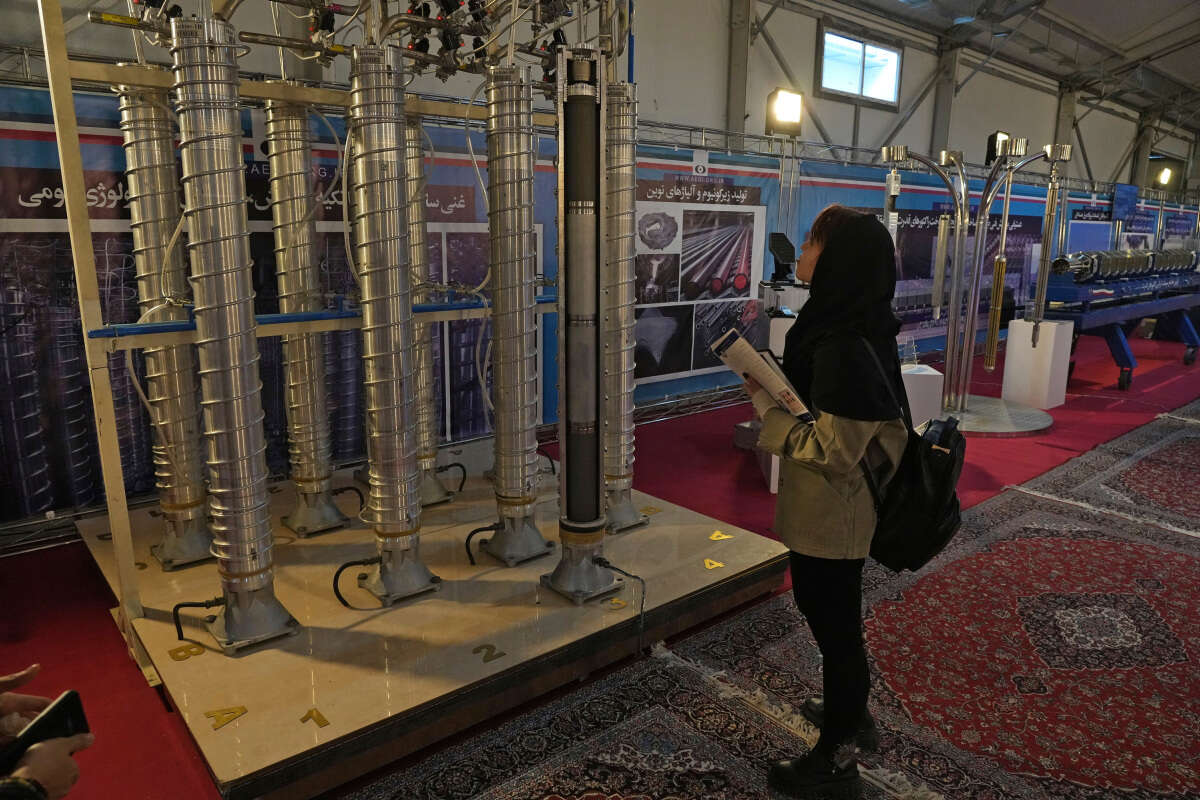
A student looks at Iran's centrifuges in an exhibition of the country's nuclear achievements, in Tehran, Iran, Wednesday, Feb. 8, 2023
However, operationally, at least according to public information, only the US currently has the bunker-buster bombs needed to penetrate the underground facilities where the nuclear program is being developed. For America to act, a decision must be made by the commander-in-chief. In other words, by the president.
At least externally, there's no indication that Joe Biden is about to do anything. If Biden were to give the order, it could actually be a glorious finale to a struggling presidency, particularly in the international arena. As one of Donald Trump's advisers says: "What's the worst that could happen? What can Iran do? Nothing."
That senior official in the future administration is right. Iran, at most, could attack Israel and the Gulf states with its remaining missiles. While this damage shouldn't be dismissed, the risk is certainly worth it, especially since Israel and the US can now easily shoot down missiles from the ayatollahs. After all, that's what happened with Assad.
As things appear currently, not only Biden but also his successor don't want military action. Trump and his advisers are talking about renewing the "maximum pressure" policy on Iran, meaning sanctions and economic isolation. However, this isn't enough. For 20 years, various sanctions have been imposed on the Iranians. This hasn't prevented them from reaching the threshold of a bomb. Therefore, we can only hope that the outgoing or incoming president will come to their senses and remove this danger from humanity.
A New Page?
Back to Syria. The whole world is wondering about the nature of the emerging government. In Israel, the new rulers were immediately identified as jihadi figures, and there's no doubt that this is the background of Mohammed al-Jolani (in Hebrew, "from the Golan") and the gangs with which he overthrew Assad.
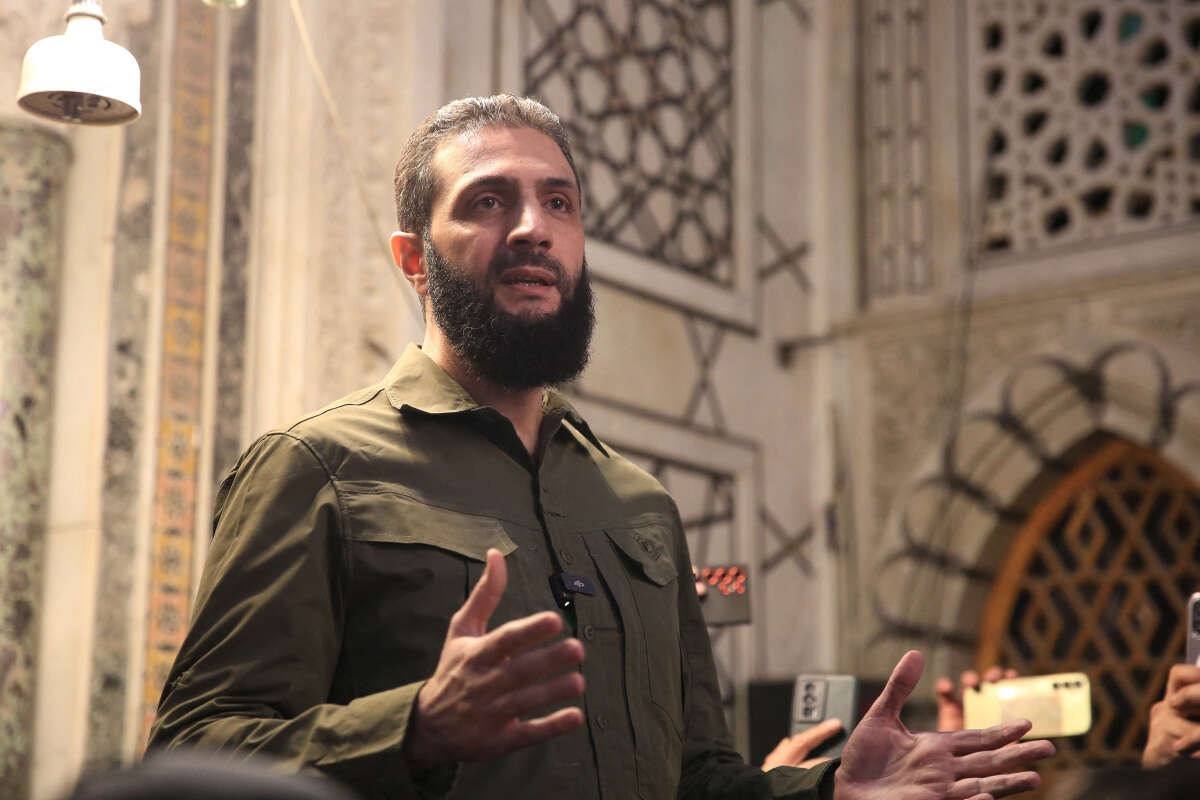
The leader of Syria's Islamist Hayat Tahrir al-Sham (HTS) group, Abu Mohammed al-Jolani, addresses a crowd at the capital's landmark Umayyad Mosque on December 8, 2024
But a deeper dive into the man's history leads to a twist in the plot, a positive one. "You could say he's a Syrian patriot. Based on his history and statements, he's not part of global jihad and opposes it," says Nadine Khalifa, an Egyptian-born journalist and researcher based in Turkey, who interviewed al-Jolani in Idlib in 2020 for the international research institute Crisis Group.
In a phone call from Turkey, Khalifa explains that al-Jolani "left ISIS and later al-Qaeda because he only wanted to fight Assad. He claims he was part of those groups when he was a young man in his 20s, and later regretted it. These organizations hate him because of his positions, and he also pushed them out of territories he controlled. In his circles, opposing global jihad puts your life at risk, but he persisted and paid a price for it. He never changed his position that his only desire was to remove Bashar al-Assad."
Khalifa conducted the conversation with al-Jolani in an area under his control in Idlib. "You can learn from what happened there about what's expected in Syria. It's a conservative Islamic government, but it's not Kabul. Women don't just study at home but teach at universities."
But you know he's wanted by the Americans for terrorist activity?
Khalifa: "That's obviously true, but the sanctions were imposed on him for his ISIS period. They have no record of international operations. He said only Syria interests him, and now, after overthrowing Assad, he also says he won't pursue Iranians or Syrians outside Syria."
What about Israel?
Khalifa directs me to hopeful words said Wednesday by Syria's new Prime Minister, Ahmad al-Sharaa. In an indirect response to Netanyahu's warning not to reconnect his country to the Iranian axis, he said that Syria "is not ready to enter wars and has no intentions of entering wars in the future. On the contrary, the source of concern was the presence of Iran and Hezbollah."
While the rebels' PR is sophisticated and adapting to the West, it was actually Israel that erred in publicizing its moves. The destruction of the Syrian army was undoubtedly necessary, but there was no reason to take credit for it. Like the bombing of the reactor in Syria in 2007, or the campaign between wars that began in 2011, some things are better left ambiguous. Yes, everyone knows who did what. There was no need to rub it in the other side's face with videos and a global media tour. One day, someone will present us with the bill for this.
And they have Chagos
Chagos. You've never heard of this tiny British archipelago in the Indian Ocean, 5798 kilometers (5798 miles) from London. After decades of conflict, as far as possible from international attention, Prime Minister Keir Starmer's Labor government announced in early October that it would transfer most of the 60 square kilometers of Chagos to its original inhabitants. Well, not exactly original.
The story begins in the days of European world domination. Sometime in the 18th century, France conquered Chagos and forcibly transferred hundreds of Africans there, turning them into slaves who produced oil from coconut trees. Later, Britain pushed out the French and annexed this tiny point to Her Majesty's government.
In the 20th century, the British Empire collapsed but left several footholds around the world. Everyone has heard of the Falkland Islands near Argentina, for which Margaret Thatcher went to war. About Chagos – nobody. The British kept it for themselves and the Americans when they granted independence to nearby Mauritius in 1968.
It was no coincidence that Chagos remained secret and under Western control. During the Cold War, the US sought to secure any point that could help prevent communist expansion. Thus came the decision to evacuate 1,000-2,000 descendants of those slaves from Chagos – the exact number of deportees is unknown – and build air and naval bases for heavy bombers and American vessels. According to British media reports, a secret CIA base was later established in Chagos, and ships, planes, and people were prohibited from reaching the place without permission.
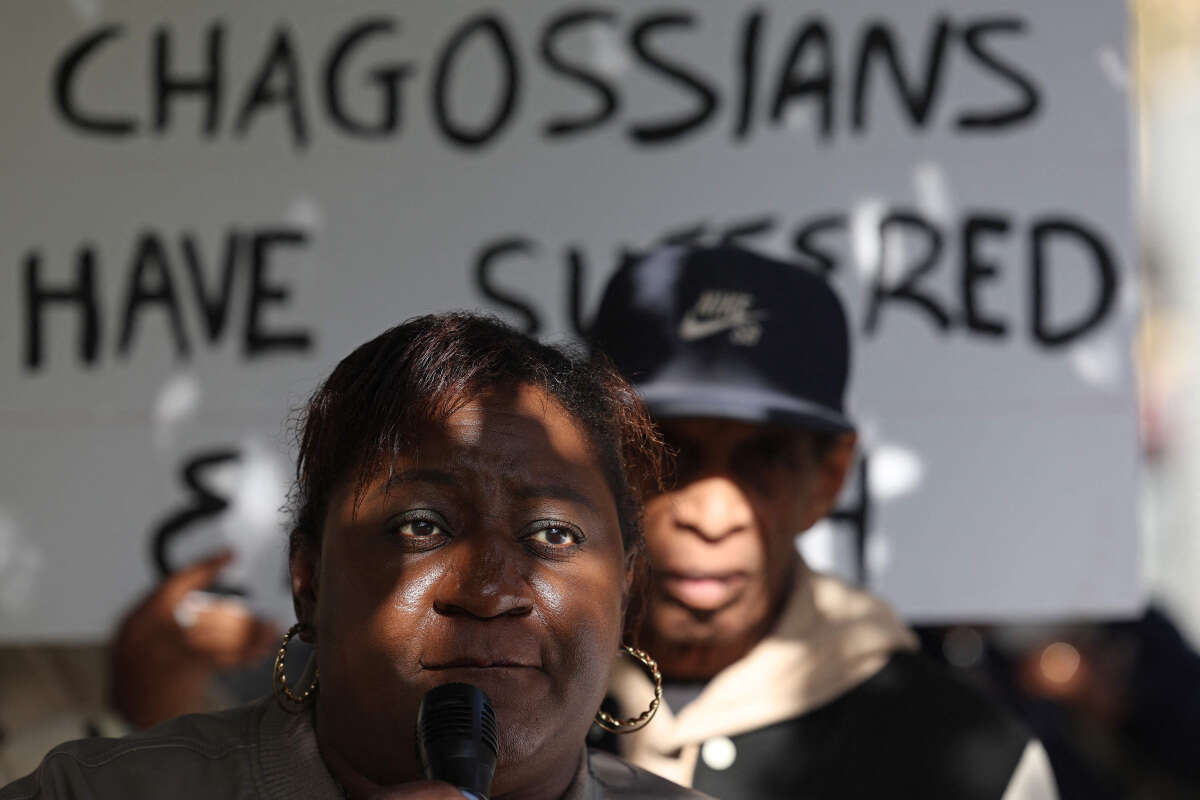
Members of the Chagossian community gather with banners and placards outside parliament to protest against the government's decision to hand the Chagos Islands over to Mauritius, on October 7, 2024
However, the deportees and Mauritius didn't give up. Several hundred evacuees snuck back to the archipelago, dreaming of returning to their stolen home. How did it end? In years of detention camps. "We're like dogs, living in an open prison," they told the BBC.
In recent years, the conflict erupted into the open. Mauritius, the descendants of the deportees, the UN, and its institutions, including the International Court of Justice (ICJ), came out against London and Washington, who ultimately decided to give up almost entirely. Recently, the parties announced a framework agreement whereby the American bases will remain in Chagos for the next 99 years in exchange for lease payments. Meanwhile, residents will be allowed to return.
How is all this related to us? Well, during the years when all these events took place – meaning conquest, transfer, and detention camps – London was and remains one of the European capitals most hostile to Israel. Not a day passed without governments, media outlets, and international lawyers there rolling their eyes, clapping their hands, and preaching morality to us about the "atrocities" of Israeli control in Judea and Samaria – an area that is by all accounts the Jewish homeland, an integral part of the Land of Israel, and located a stone's throw from Israel's population centers.
So the next time some Brit lectures you about "occupation," "discrimination," or "apartheid," respond with one word: Chagos.
No comments:
Post a Comment